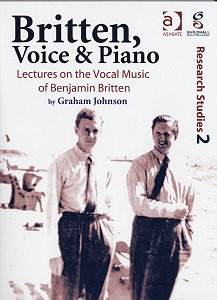In November 2001 the Guildhall School of Music
and Drama in London presented a small festival of Britten's music.
The festival - eight concerts in all - was devised by Graham
Johnson and centred on the School vocal department and accompaniment
course. Its aim was to explore the composer's links with literature
and the human voice, and the artists involved included both staff
and students-among them all the School's then-current student
accompanists, a cross-section of singers both present and past,
and a number of other solo instrumentalists.
Under the overall title Let the Florid Music
Praise (the opening title of Britten's first song cycle On
This Island, Op.11), eight programmes were based and presented
on particular themes related to the stated subject (though coverage
did not pretend to be either comprehensive or chronological),
each introduced by a pre-performance lecture/commentary by Graham
Johnson. These opening talks were expanded by Johnson for publication
in their present form, in which they are now able to discuss both
the music performed and related subject-matter in greater detail
than was originally possible. In addition, an aural record of
much of the actual performances was preserved in the form of two
CDs which most usefully accompany the volume.
In effect, virtually all Britten's solo folksong
settings and most of his solo song-cycles are featured (missing
are A Charm of Lullabies and, more regrettably, the late
masterpiece Who Are These Children?), along with the five
Canticles, a number of early song settings and the Auden cabaret
songs, and various supporting instrumental works such as the Six
Metamorphoses after Ovid, the Lachrymae, the Cello
Sonata and the Third Cello Suite. Chapter titles such as Britten
abroad: Italy, Poland, France and Germany, Britten the
Elizabethan, Britten and Russia, Britten and the English
Landscape, give some flavour of the contents.
Much additional and unique interest pertains
to the volume in the extent of Johnson's personal contribution
to his text, both by way of autobiographical reminiscences of
his relationship with both Britten and Peter Pears during the
years he worked directly with them at Aldeburgh and in his discussion
of the homosexual subtext underlying Britten’s life and musjc
- a subject revealed and explored both truthfully, 'from the inside'
as it were.
Benjamin Britten was a musical genius, whose superlative capabilities
not only as a first-rate composer but as an accompanist and conductor
of no less remarkable quality, are unparalleled in this country.
The celebration of one facet of his genius that this book represents
should be, and one hopes will be, only the first of many similar
ventures.
© John Talbot
see
also review by Rob Barnett

![]() Ashgate/Guildhall
School of Music and Drama, 2003: x, 270pp, plus two CDs.
Ashgate/Guildhall
School of Music and Drama, 2003: x, 270pp, plus two CDs.